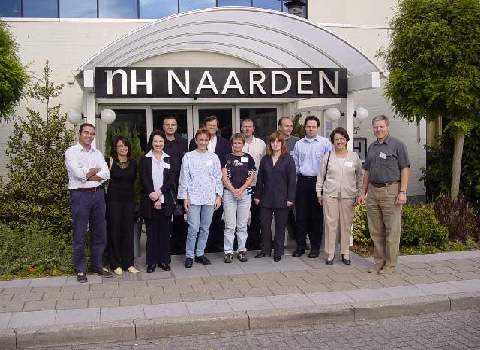Advances in Myotubular Myopathy
- Number 118
- Date 26 September 2003
The ENMC consortium on advances in myotubular myopathy (MTM) held its 6th Workshop in Naarden, the Netherlands, the weekend from 26-28th September 2003. It was attended by 19 active participants from Australia, Finland, France, Germany, Italy, Switzerland, the United Kingdom and the USA. The meeting opened with an overview on the genotype-phenotype correlation on 340 families and 196 different mutations in the myotubularin gene (MTM1) in order to predict severity of manifestations with the type of mutation and domain position. Most were private mutations but 7 mutations were more recurrent and most were found in exons 4-8-12. Direct exon sequencing improves molecular diagnosis in relation to other screening methods. Manifesting carriers of MTM1 are rare (3 out of 43 studied).
In addition to mutation analysis the protein status can be studied by immunoprecipitation but not yet routinely.
A whole morning was concentrated on studies that try to unravel the subcellular localization and the function of MTM1 and myotubularin related proteins (MTMRs), highlighting the specific substrates, the catalytic activities and the crystallographic structure of MTMR2. Preliminary observations show that MTMRs are expressed ubiquitously but their amount of expression varies differently among tissues. Two MTMRs are responsible for 2 forms of demyelinating Charcot-Marie-Tooth neuropathies (CMT) type 4B1 (MTMR2) and CMT4B2 (MTMR13/SBF2), showing characteristic myelin outfoldings at the nerve biopsy. The knock out mouse model of MTM1 showed many similarities with the human disorder. There was a moderate growth deficiency at birth and progressive muscle weakness together with appearance of muscle fibers showing central nuclei. Fibers were normally differentiated and showed no significant necrosis and regeneration, but fiber atrophy with structural disorganization was found. This model seems promising for therapeutic strategies.
A review on clinical and histopathological aspects of autosomal dominant and autosomal recessive centronuclear myopathies was presented. Following the chromosomal localization of a canine model to chromosome 2 and searching on the syntenic human region on chromosome 10, a candidate gene coding for a tyrosine phosphatase-like protein was chosen but yielded no mutations in some autosomal dominant and recessive patients with centronuclear myopathy. Moreover a genome wide search on a few autosomal dominant families indicated a new chromosomal locus but further confirmation is required adding other informative families. In patients with no mutations in MTM1 and in the myotonic dystrophy gene a candidate gene approach is on-going to find new disease genes for centronuclear myopathies.
A few patients with pathogenetic mutations in the MTM1 gene showed an overgrowth syndrome which may be related to abnormally increased levels of IGFs. The workshop consortium agreed to collect serum from MTM1 patients to confirm these trophic factor abnormalities.
An extended report of the meeting will be submitted for publication in Neuromuscular Disorders.
Prof. Enrico Bertini (Rome, Italy)
Dr. Wolfram Kress (Würzburg, Germany)

ENMC
Lt. generaal van Heutszlaan 6
3743 JN BAARN
The Netherlands
+ 31- 35-5480481
enmc@enmc.org
We may request cookies to be set on your device. We use cookies to let us know when you visit our websites, how you interact with us, to enrich your user experience, and to customize your relationship with our website.
Click on the different category headings to find out more. You can also change some of your preferences. Note that blocking some types of cookies may impact your experience on our websites and the services we are able to offer.
These cookies are strictly necessary to provide you with services available through our website and to use some of its features.
Because these cookies are strictly necessary to deliver the website, refusing them will have impact how our site functions. You always can block or delete cookies by changing your browser settings and force blocking all cookies on this website. But this will always prompt you to accept/refuse cookies when revisiting our site.
We fully respect if you want to refuse cookies but to avoid asking you again and again kindly allow us to store a cookie for that. You are free to opt out any time or opt in for other cookies to get a better experience. If you refuse cookies we will remove all set cookies in our domain.
We provide you with a list of stored cookies on your computer in our domain so you can check what we stored. Due to security reasons we are not able to show or modify cookies from other domains. You can check these in your browser security settings.
These cookies collect information that is used either in aggregate form to help us understand how our website is being used or how effective our marketing campaigns are, or to help us customize our website and application for you in order to enhance your experience.
If you do not want that we track your visit to our site you can disable tracking in your browser here:
We also use different external services like Google Webfonts, Google Maps, and external Video providers. Since these providers may collect personal data like your IP address we allow you to block them here. Please be aware that this might heavily reduce the functionality and appearance of our site. Changes will take effect once you reload the page.
Google Webfont Settings:
Google Map Settings:
Google reCaptcha Settings:
Vimeo and Youtube video embeds:
The following cookies are also needed - You can choose if you want to allow them:
You can read about our cookies and privacy settings in detail on our Privacy Policy Page.
Privacy Policy